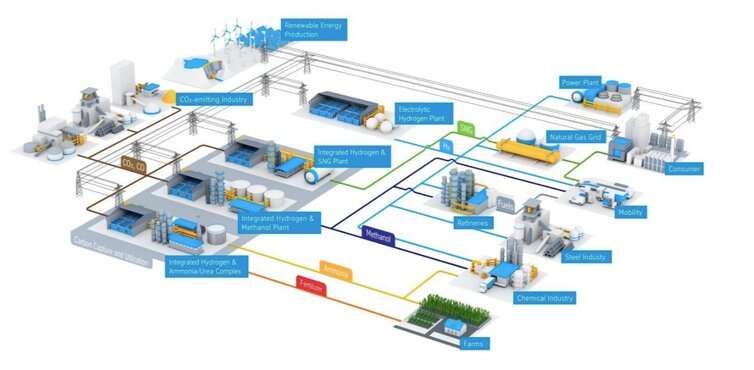How power-to-X technology could help decarbonise Indonesia’s industrial sector
As one of the world’s leading economies, Indonesia has announced an ambitious plan to build a green industrial park in North Kalimantan.
Located in the northern part of Indonesian Borneo, the 30,000-hectare industrial area will focus on manufacturing environment-friendly products using low-emission processes and green energy sources.
This plan could provide the momentum needed to boost development of eco-friendly synthetic fuel and chemical industries through what’s called “power-to-X” (P2X) technology.
In Indonesia, the utilization of renewable energy has only focused on decarbonising electricity generation. Through P2X technology, we can also use renewable energy to tackle challenges in high-emission sectors such as chemical industries and synthetic fuel development.
What is P2X?
P2X is a technology to produce synthetic fuel and chemicals using renewable energy. The primary process of P2X is electrolysis: converting raw materials into products using electricity generated from renewable energy.
This process can include:
- water electrolysis to produce hydrogen
- carbon dioxide electrolysis to produce synthetic gas (syngas) and hydrocarbons (compounds that are typically derived from petroleum oil and gas)
- electrolysis of nitrogen from air into ammonia (raw material for batteries and fertilizer)
- electrolysis of oxygen from the air into hydrogen peroxide disinfectants.
Hydrogen production is among the core P2X processes. Hydrogen can be used as an alternative source of clean energy and industrial feedstock for fertilizer manufacturing.
Through P2X, “green hydrogen” could also help reduce our reliance on “black hydrogen”—which is produced from fossil fuels. We can suppress carbon emissions from black hydrogen production by 830 million tons of carbon dioxide per year.
P2X could also accelerate a green transition in heavy industries that still rely on fossil energy (for example, cement manufacturers) through carbon capture technology. Captured carbon dioxide can be transformed into synthetic gas, formic acid (for the rubber industry), methanol and ethanol (alternative fuels) via electrolysis.
Applying P2X in Indonesia’s green industrial park
The government’s plan to build a hydropower plant in the Kayan River will be an important stepping stone for P2X technology in the North Kalimantan industrial park. Construction has just started in December 2021 and the plant is expected to be operating in 2025.

But such plants generally require enormous areas of land. Thus, their construction has significant impacts on the environment and local communities. Several parties are raising concerns about possible negative impacts on the forest and river ecosystems as well as the people living in the region.
To address the environmental risks, conventional hydropower technology can be replaced with pumped storage hydropower technology—which requires a smaller area than conventional hydropower. Floating solar panels can also be installed along the surface of the river to diversify energy sources.
Based on a recent study, for instance, Kalimantan has vast solar energy potential.
Another factor to be considered is what types of industries are suited for development in the North Kalimantan region.
Due to its high water flow rate (about 1,700 mᶟ/s), the Kayan River is an enormous water source. It can be used to generate vast amounts of green hydrogen—a feedstock to produce ammonia.
Potential buyers are in place, including PT Pupuk Kalimantan Timur in Bontang, East Kalimantan—located around 354km from Tarakan, the capital of North Kalimantan.
Furthermore, synthetic natural gas and methanol production using hydrogen is ideal for providing “green fuels” for the state-owned oil refinery in Balikpapan, East Kalimantan province.
What needs to be done?
To prove its commitment to developing a green industrial park, the government should consider the following points.
First, the government must formulate strategies for decarbonising the industrial sector through P2X.
Establishing a clear roadmap can build trust with domestic and foreign investors. This roadmap can become a cornerstone for developing other green industrial parks.
Indonesia can also learn from Germany and Japan, which have produced green hydrogen with P2X technology.
Second, the government should support research in electrolysis technology to increase the economic viability of P2X. Other essential support includes funding from international partners or financial institutions.
Green hydrogen from expanded wind power in China: Reducing costs of deep decarbonization
This article is republished from The Conversation under a Creative Commons license. Read the original article.![]()
Citation:
How power-to-X technology could help decarbonise Indonesia’s industrial sector (2022, January 17)
retrieved 17 January 2022
from https://techxplore.com/news/2022-01-power-to-x-technology-decarbonise-indonesia-industrial.html
This document is subject to copyright. Apart from any fair dealing for the purpose of private study or research, no
part may be reproduced without the written permission. The content is provided for information purposes only.
For all the latest Technology News Click Here
For the latest news and updates, follow us on Google News.

